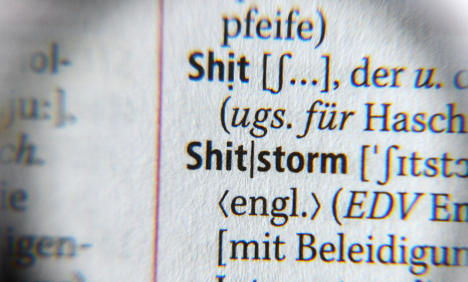For years the German language has been overwhelmed with a flood of unnecessary and ugly English words and expressions – an advert for yoghurt talks about getting that weekend feeling a television channel runs a Kiddie Contest.
Us Germans do power walking wear outdoor jackets and beach wear, while putting on anti-ageing cream and style our hair.
Deutsche Bahn is perhaps the worst of all offenders with its tickets, service point and McClean.
Some people find it cool but others – the majority of Germans – are annoyed about the superfluous use of English junk and see it as showing contempt for their language.
It is absurd and undignified to replace German words such as Leibwächter, Karte and Fahrrad with bodyguard, card and bike.
This Anglicization of the German language has been accompanied with the global expansion of the American way of life, behind which stands the economic and political power of the USA.
It has changed many countries and their languages and Germany is no different. A lack of loyalty to their language on behalf of some Germans and a readiness to pander to English have, more than anywhere else, led to a mixing of the languages – Denglisch.
We want to counter the Anglicization of German and remind people about the beauty and value of their mother tongue. We want to protect and develop our language. The ability to invent new words and to describe new objects should not stop.
Our society, which has 35,000 members, is not against foreign words being used in German – even English ones. We have no objection to using fair, interview, trainer, doping and slang.
We do not hate foreign words. Most of our board members speak foreign languages and two of our members probably speak better English than any American. One was a pilot for a US airline.
We have nothing anything against German importing words from other languages. A third of all German words are imported.
What we do have a problem with is this attempt to use Denglisch to impress others. People intentionally avoid German words even though they could use it. It is an attempt to suck up to others. That annoys us.
We have a problem with words such as event, highlight, shooting star, outfit which are used to glorify the everyday and the banal. This drivel shuts off many Germans, who do not know these English words, from their own language.
I am often asked for a statement on a certain subject. I tell those who ask that I do not give statements. If they asked me using a German word it would be a different matter. I will give an Aussage.
There is almost always a suitable German word which works and fits with what people want to say.
Take the word highlight. I once counted 30 ways to say highlight in German yet they have all been replaced with one English word.
To counter Denglisch we write to firms guilty of using it, pick a “winner” each year for our language adulterator award and celebrate our annual German Language Day.
Germans who can’t speak English use Denglisch to prance about and say look, I can speak English too. This has to stop.
Professor Walter Krämer is the founder of the Verein Deutsche Sprache and teaches at the Technical University in Dortmund.




 Please whitelist us to continue reading.
Please whitelist us to continue reading.
Member comments